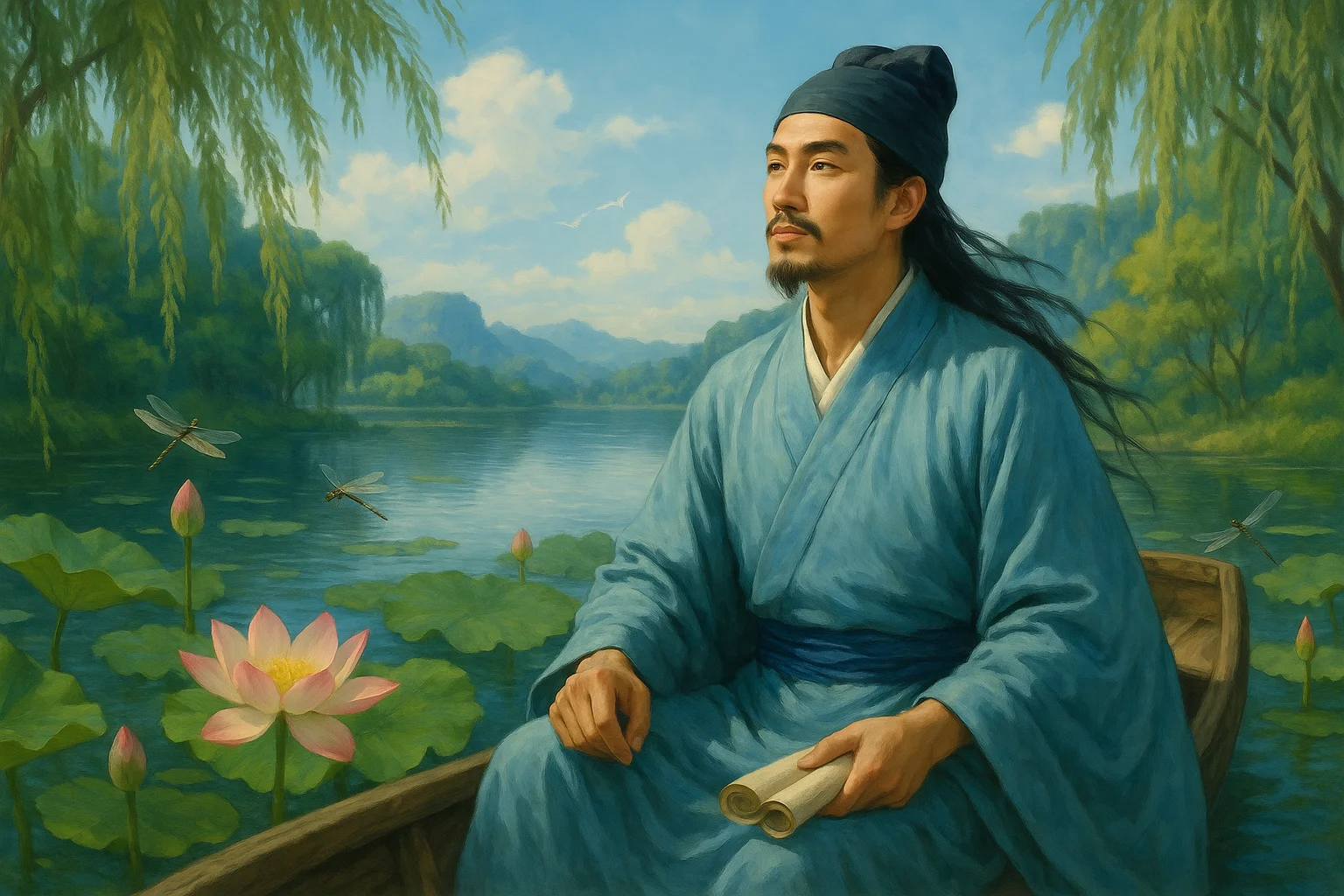Must autumn’s breath be mourned? Not so, I find—
This light chill is the weather most refined.
Though red lotuses fade from green pool’s face,
Small coin-like lotus leaves still find their place.
Original Poem
「秋凉晚步」
杨万里
秋气堪悲未必然,轻寒正是可人天。
绿池落尽红蕖却,荷叶犹开最小钱。
Interpretation
Composed during the Chunxi era (1174-1189) when Yang Wanli was in his fifties, this lyric dismantles a millennia-old literary trope—autumn as melancholy metaphor. Written during an evening stroll, it exemplifies his mature "Chengzhai Style," where nature observation becomes philosophical rebellion against poetic convention. Here, autumn sheds its elegiac garb to reveal climatic perfection and cyclical renewal.
First Couplet: "秋气堪悲未必然,轻寒正是可人天。"
Qiū qì kān bēi wèi bìrán, qīng hán zhèng shì kěrén tiān.
"Autumn's breath invites grief"—
not necessarily so.
This light chill is precisely
weather to cherish.
The opening volley challenges literary history with colloquial defiance ("not necessarily" 未必然). Where poets since Song Yu's "Nine Arguments" (3rd century BCE) equated autumn with decline, Yang asserts meteorological fact: crisp air as physiological delight. The couplet's pivot from negation ("not") to affirmation ("precisely") enacts his perceptual revolution.
Second Couplet: "绿池落尽红蕖却,荷叶犹开最小钱。"
Lǜ chí luò jìn hóng qú què, hé yè yóu kāi zuì xiǎo qián.
In the green pool, red lotuses
have all departed—
yet new leaves unfurl
like tiny coins.
Yang's gaze shifts from air to water, tracking seasonal transition. The "departed" (却) lotuses acknowledge decay, but "tiny coins" (最小钱) rebrand senescence as economic metaphor—nature's small change promising future wealth. These nascent leaves, round as cash coins in Song markets, symbolize cyclical hope amidst apparent loss.
Holistic Appreciation
This poem constructs an anti-elegy. The first couplet deconstructs autumnal pathos through sensory truth ("light chill"); the second validates renewal through botanical fact (new leaves post-bloom). Yang's genius lies in telescoping time—acknowledging past glory ("red lotuses") while spotlighting present potential ("tiny coins").
The pool becomes a temporal ledger: the debit of fallen flowers offset by the credit of sprouting leaves. This ecological accounting reflects Yang's Neo-Confucian worldview—nature's patterns as moral instruction, where decay and rebirth are inseparable halves of existence.
Artistic Merits
- Intertextual Rebellion
The poem's first line consciously misquotes canonical "autumn grief" tropes, establishing Yang as literary iconoclast. - Metaphoric Innovation
"Tiny coins" transforms botanical observation into economic allegory—nature's cyclical economy mirroring human systems. - Phenological Precision
The precise sequencing (flowers fade → leaves emerge) demonstrates scientific observation characteristic of Song literati. - Colloquial Sublime
Phrases like "not necessarily" (未必然) inject vernacular energy into classical form, hallmark of Yang's style.
Insights
Yang Wanli recalibrates our seasonal perceptions. His autumn isn't about loss but exchange—flowers for leaves, warmth for crispness. The "tiny coins" metaphor suggests nature operates on principles of balanced reciprocity, not irreversible decline.
For contemporary readers facing climate anxiety, this 12th-century poem offers an antidote: observe closely, and you'll find nature's resilience written in small green promises. Yang teaches us to read ecosystems as cyclical narratives rather than linear tragedies—a vision both scientifically astute and spiritually sustaining.
About the Poet

Yang Wanli (杨万里 1127 - 1206), a native of Jishui in Jiangxi, was a renowned poet of the Southern Song Dynasty, celebrated as one of the "Four Great Masters of the Restoration" alongside Lu You, Fan Chengda, and You Mao. He attained the jinshi degree in 1154 and rose to the position of Academician of the Baomo Pavilion. Breaking free from the constraints of the Jiangxi School of Poetry, he pioneered the lively and natural "Chengzhai Style," advocating for learning from nature and employing plain yet profound language. His poetry, often drawing inspiration from everyday life, profoundly influenced later schools of lyrical expression, particularly the Xingling (Spirit and Sensibility) School.












